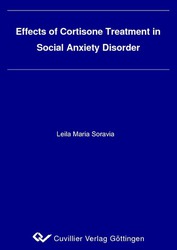| Areas | |
|---|---|
| Serie de libros (96) |
1381
|
| Nachhaltigkeit |
3
|
| Gesundheitswesen |
1
|
| Letra |
2370
|
| Medienwissenschaften | 16 |
| Teología | 57 |
| Filosofía | 102 |
| Derecho | 424 |
| Economía | 851 |
| Ciencias sociales | 418 |
| Ciencias del deporte | 48 |
| Psicología | 233 |
| Educación | 190 |
| Historia | 183 |
| Arte | 111 |
| Ciencias culturales | 166 |
| Literatur | 117 |
| Lingüística | 88 |
| Ciencias Naturales |
5408
|
| Ciencias Ingeniería |
1795
|
| General |
98
|
|
Leitlinien Unfallchirurgie
5. Auflage bestellen |
|
Erweiterte Suche
Effects of Cortisone Treatment in Social Anxiety Disorder (Tienda española)
Leila Maria Soravia (Autor)Previo
Indice, Datei (8,4 KB)
Lectura de prueba, Datei (32 KB)
The essential feature of social phobia is the fear of social interactions and performance situations when the person feels they are under scrutiny by others. A recent study in persons with post-traumatic stress disorder showed that low-dose cortisone treatment over the period of a month inhibited the retrieval of traumatic memories. Previous studies suggest that elevated levels of glucocorticoids inhibit memory retrieval in animals and healthy humans. However, the extent of the beneficial effect of cortisone treatment in social phobia is not clear. We therefore examine the effect of acute cortisone treatment in patients with social phobia and secondly compare them to a non-anxious, healthy control group. In a double-blind, placebo-controlled study, 21 male patients with social phobia according to DSM-IV criteria and 22 non-anxious control subjects underwent a socio-evaluative stress test consisting of an unprepared speech and a mental arithmetic test performed in front of an audience. One hour before the stress test, subjects received 25 mg cortisone or placebo orally. In addition to repeatedly measured physiological (cortisol level, heart rate) and psychological parameters (anxiety, mood, phobic behavior), implicit and explicit memory performance was tested. Cortisone treatment significantly reduced anxiety levels by 37% in patients suffering from social phobia, as compared to placebo treatment and further significantly decreased heart rate reactivity. Social phobics treated with cortisone experienced anxiety, physical discomfort and avoidance behavior at the same level as healthy controls. Better recall of room-related but not person-related details in cortisone treated persons with social phobia but not in the control subjects, indicates an enlarged focus of attention resulting from reduced anxiety. Our results show that a pharmacological elevation of circulating cortisol reduces cardinal symptoms of social phobia in a social stress situation. Cortisone treatment in patients with social phobia has specific anxiolytic effect such that fear is reduced to the normal range of control subjects. Further beneficial effects of meliorated attention processing can be interpreted as a result of effective treatment. The fact that the administration of 25 mg cortisone does not cause any known side effects suggests that it might have beneficial effects combined with behavioral confrontation therapy.
| ISBN-10 (Impresion) | 3865375375 |
| ISBN-13 (Impresion) | 9783865375377 |
| ISBN-13 (E-Book) | 9783736915374 |
| Idioma | Alemán |
| Numero de paginas | 126 |
| Edicion | 1 Aufl. |
| Volumen | 0 |
| Lugar de publicacion | Göttingen |
| Lugar de la disertacion | Zürich |
| Fecha de publicacion | 11.08.2005 |
| Clasificacion simple | Tesis doctoral |
| Area |
Psicología
|








